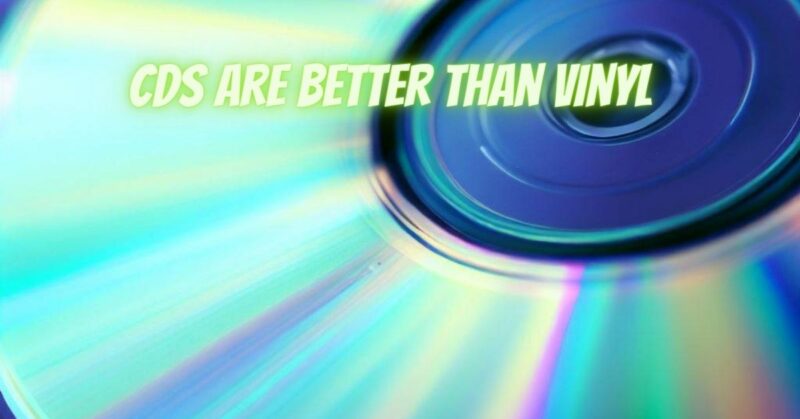The debate over audio formats has raged on for decades, with vinyl records and CDs often taking center stage. While vinyl enthusiasts extol the analog charm and warmth of records, CDs offer a set of distinct advantages that cater to those who prioritize accuracy, convenience, and technological precision. In this article, we delve into the reasons why CDs are often considered superior to vinyl records in certain aspects.
1. Digital Precision:
CDs are a digital audio format that employ precise sampling and encoding techniques. This digital nature eliminates the inherent imperfections associated with analog recording and playback, ensuring accurate sound reproduction that faithfully captures the original recording.
2. Signal-to-Noise Ratio:
CDs boast a higher signal-to-noise ratio compared to vinyl records. This means that the audio signal on a CD is less susceptible to noise and interference, resulting in a cleaner and more transparent sound. The absence of surface noise and other analog artifacts ensures a pristine listening experience.
3. Consistency and Durability:
CDs offer consistent playback quality across repeated plays. Unlike vinyl records, which experience wear with each rotation of the stylus, CDs do not degrade over time. This consistency makes CDs a reliable choice for audiophiles seeking long-lasting audio quality.
4. Dynamic Range:
The wider dynamic range of CDs allows them to faithfully reproduce a broad spectrum of sound, from the quietest whispers to the most thunderous crescendos. This feature enhances the overall listening experience, particularly for genres that rely on dynamic contrasts.
5. Minimal Playback Distortion:
CD playback systems are designed to minimize distortion. Unlike vinyl, where factors such as stylus wear, tracking errors, and turntable resonance can affect sound quality, CDs are played using laser technology that is less prone to distortion.
6. Convenience:
CDs offer unparalleled convenience in terms of storage and accessibility. A single compact disc can hold up to 80 minutes of music, making it easy to enjoy entire albums without having to flip or change sides. CDs are also compact and easy to store, requiring minimal physical space.
7. Replication and Mass Production:
CD replication and mass production are highly streamlined processes, ensuring consistent quality across copies. Vinyl records, due to their intricate manufacturing process and sensitivity to variations, might exhibit subtle differences between copies.
8. High-Resolution Audio:
While CDs offer standard CD-quality audio, they also paved the way for high-resolution audio formats, such as SACD (Super Audio CD) and DVD-Audio. These formats provide even higher levels of audio fidelity, surpassing the capabilities of vinyl records.
9. Accessibility and Preservation:
CDs can be easily converted to digital files for playback on various devices, allowing listeners to enjoy their music in different settings. Digital files also enable easier sharing and preservation of music collections.
The advantages of CDs over vinyl records lie in their technological precision, accurate sound reproduction, convenience, and durability. While vinyl records undoubtedly offer a unique and nostalgic listening experience, CDs cater to those who prioritize transparency, consistency, and the benefits of digital technology. The beauty of the debate lies in personal preference, with listeners choosing the format that resonates most with their musical tastes and values. Whether you embrace the crystal clarity of CDs or the warm embrace of vinyl, the journey of musical discovery continues, offering a symphony of choices for audiophiles and music enthusiasts alike.


